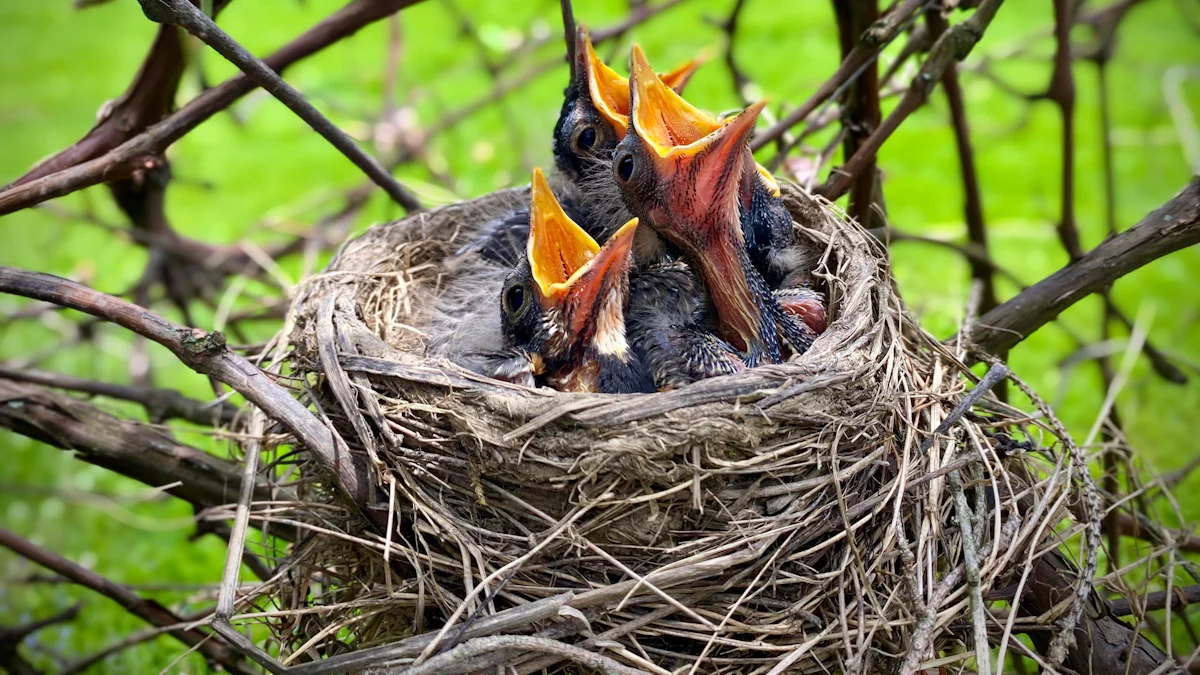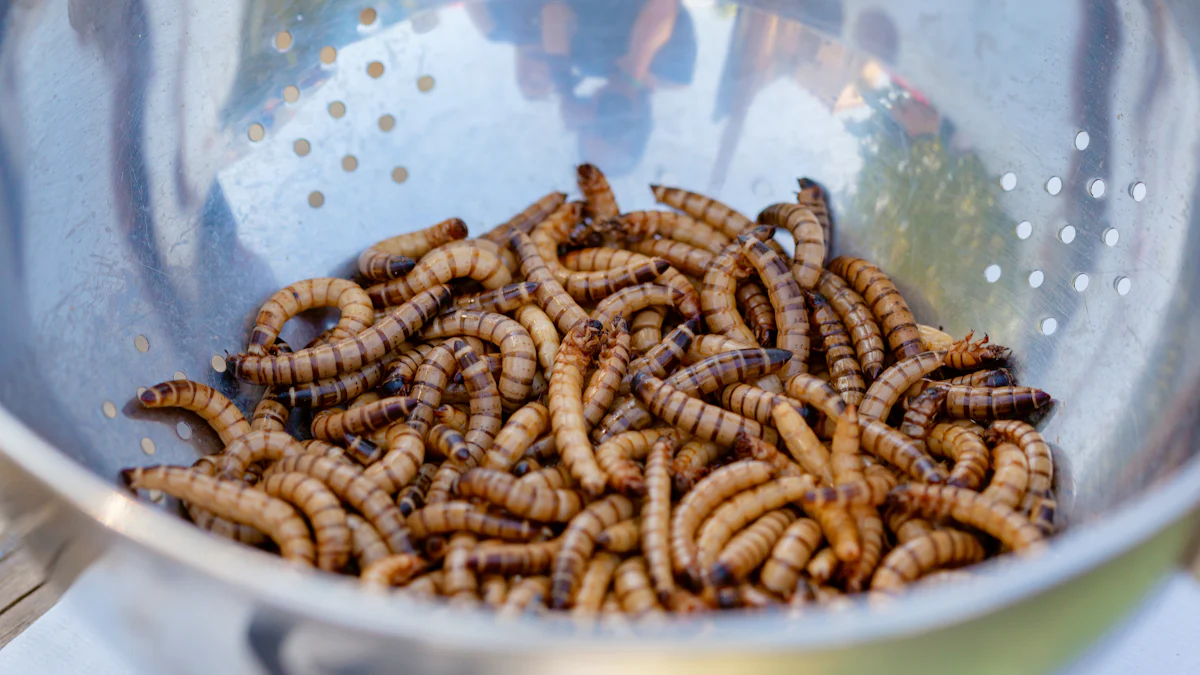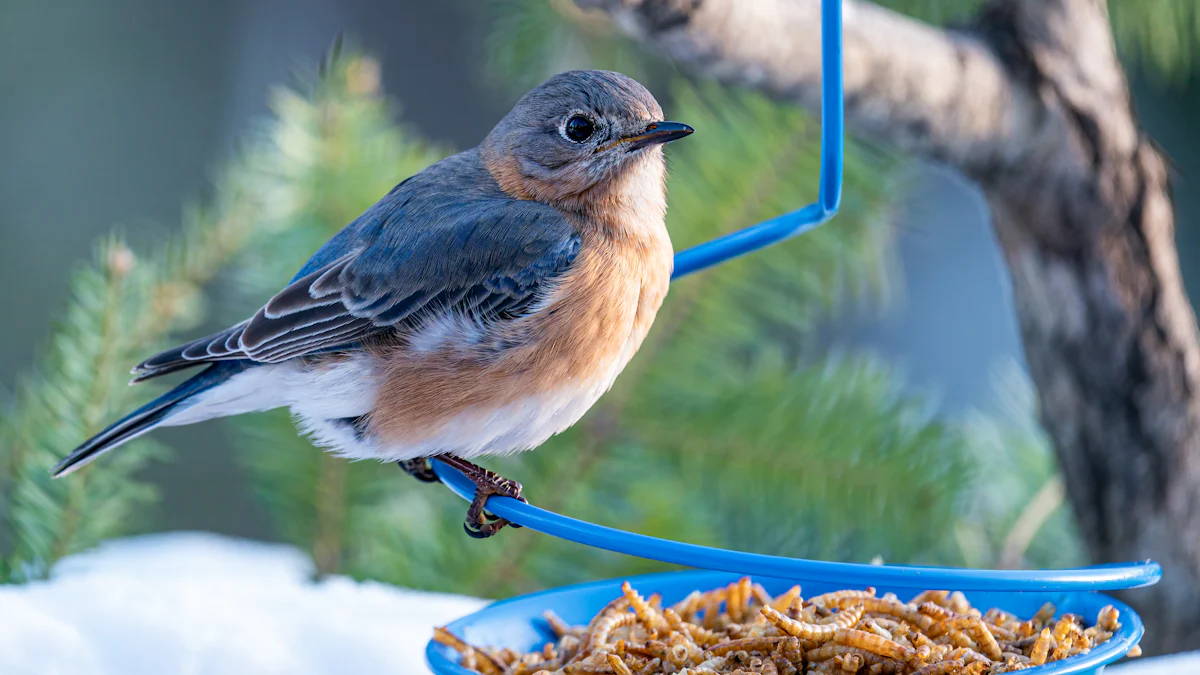
Dried mealworms for baby birds can be a helpful supplement, but they need proper preparation. These mealworms contain about 50% protein, which supports muscle and feather growth, and 25% fat, providing energy. However, their lack of moisture makes them harder to digest. Soaking them in water helps rehydrate and soften them, making them safer for young birds.
DpatQueen offers high-quality dried mealworms for baby birds that meet FDA standards. Their products provide essential nutrients for pets and come in various package sizes. Customers can shop confidently, knowing they’re getting safe and affordable options for their birds.
Key Takeaways
- Soak dried mealworms in water before giving them to baby birds. This softens them and makes them easier to eat. It also helps prevent the birds from getting dehydrated.
- Dried mealworms should only be a small part of their diet. Mix them with seeds, fruits, and other foods for better nutrition.
- Buy good-quality dried mealworms from trusted brands like DpatQueen. Their products are safe and give important nutrients to baby birds.
Nutritional Value of Mealworms for Baby Birds

Protein Content and Its Role in Growth
Protein is one of the most important nutrients for baby birds. Dried mealworms contain about 50% protein, making them an excellent source of this essential nutrient. Protein helps baby birds grow strong muscles, develop healthy feathers, and maintain vital bodily functions. During the breeding season, this high protein content becomes even more critical, as it supports rapid growth and development.
Studies back up the benefits of mealworms for baby birds. Research published in PLOS One shows that insect protein, including mealworms, closely matches the dietary needs of birds. Another study by the Royal Society for the Protection of Birds (RSPB) found that nestlings fed mealworms grew faster and had better survival rates. These findings highlight why mealworms can be a valuable addition to a baby bird’s diet.
Moisture Deficiency in Dried Mealworms
While dried mealworms are rich in protein, they lack moisture. This can be a problem for baby birds, as they rely on their food for hydration. Live mealworms, on the other hand, provide both nutrients and water, making them a better choice during nesting seasons. Feeding only dried mealworms without rehydrating them could lead to dehydration in young birds. Soaking dried mealworms in water before feeding is a simple way to make them safer and more beneficial.
Are Dried Mealworms a Balanced Diet for Baby Birds?
Dried mealworms alone cannot provide a balanced diet for baby birds. They are missing key nutrients that birds need for overall health. A proper diet should include a mix of seeds, fruits, and suet to ensure all nutritional needs are met. Over-relying on mealworms for baby birds can lead to deficiencies and even reduce their natural foraging instincts. Additionally, contaminated mealworms from unreliable sources can pose health risks. To avoid these issues, it’s best to use dried mealworms as a supplement rather than the main food source.
DpatQueen offers high-quality dried mealworms that meet FDA standards, ensuring safety and nutrition for your pets. Their products come in various package sizes, making it easy to find the right fit for your needs. With DpatQueen, you can confidently provide your baby birds with a safe and nutritious treat.
Preparing Dried Mealworms for Baby Birds
Why Rehydration Is Essential
Rehydrating dried mealworms is a crucial step before feeding them to baby birds. This process softens the mealworms, making them easier for young birds to eat and digest. It also mimics the texture of live insects, which baby birds naturally consume. During nesting periods, parent birds often seek moist food to keep their chicks hydrated. Soaked mealworms can help prevent dehydration, especially in hot weather. A case study even showed that nestlings were more likely to accept rehydrated mealworms because of their softer texture. By soaking dried mealworms, caregivers can ensure they provide a safer and more beneficial food option.
Step-by-Step Guide to Soaking Dried Mealworms
Soaking dried mealworms is simple and doesn’t take much time. Follow these steps to prepare them for baby birds:
- Boil water and pour it into a heat-resistant container.
- Add the dried mealworms to the water.
- Let them soak for at least 30 minutes. For a softer texture, extend the soaking time to an hour or even overnight using room-temperature water.
- Drain the water and serve the rehydrated mealworms to the birds.
This method ensures the mealworms are soft, moist, and ready to eat. Always use clean water to avoid introducing contaminants.
Combining Dried Mealworms with Other Foods
Dried mealworms alone don’t provide a balanced diet for baby birds. Combining them with other foods ensures the chicks get all the nutrients they need. Sunflower hearts and black sunflower seeds add healthy fats and protein. Suet cakes or balls provide energy, while fresh fruits supply essential vitamins. Peanuts can also be included for an extra energy boost. A varied diet supports growth, prevents deficiencies, and promotes overall health. By mixing mealworms with these complementary foods, caregivers can create a nutritious and well-rounded meal for baby birds.
DpatQueen offers high-quality dried mealworms that meet FDA standards, ensuring safety and nutrition. Their products come in various package sizes, making it easy to find the right fit for your needs. With DpatQueen, you can confidently provide your baby birds with a safe and nutritious treat.
Dried Mealworms vs. Live Mealworms for Baby Birds

Benefits of Dried Mealworms
Dried mealworms offer several practical advantages for bird caretakers. They have a long shelf life, making them easy to store without worrying about spoilage. Unlike live mealworms, they don’t require refrigeration, which simplifies storage and reduces costs. Handling dried mealworms is also less messy, making them a convenient option for feeding baby birds.
| Advantage | Description |
|---|---|
| Long shelf life | Dried mealworms can be stored for extended periods without spoiling. |
| No refrigeration needed | They do not require cold storage, simplifying storage conditions. |
| Less messy to handle | Handling dried mealworms is cleaner compared to live mealworms. |
| Bulk storage | They can be stored in large quantities and used as needed, minimizing waste. |
Additionally, dried mealworms are more affordable. A pound of dried mealworms costs $15-$25 and contains thousands of worms, while 1,000 live mealworms cost about $20. This makes dried mealworms a budget-friendly choice for those feeding baby birds regularly. Soaking them in water enhances their appeal and makes them easier for chicks to consume, especially during nesting periods when hydration is critical.
Benefits of Live Mealworms
Live mealworms provide essential hydration for baby birds, which is something dried mealworms lack. Their high moisture content helps prevent dehydration, especially during hot weather or nesting seasons. Live mealworms also contain vital nutrients like amino acids, vitamins, and minerals that support healthy growth and development.
Unlike dried mealworms, live ones mimic the natural diet of baby birds, encouraging natural feeding behaviors. They are particularly beneficial for nestlings, as they provide both nutrition and hydration in one package. However, live mealworms require careful storage and handling. They need refrigeration to stay fresh, which can increase costs and effort for caretakers. Additionally, they tend to disappear quickly when offered, requiring frequent replenishment.
Which Option Is Better for Baby Birds?
Choosing between dried and live mealworms depends on the specific needs of the baby birds and the caretaker’s circumstances. Live mealworms are ideal for hydration and nutrition, making them the better choice during nesting seasons. However, they require more effort to store and handle. Dried mealworms, on the other hand, are more convenient and cost-effective. Soaking them can make them a suitable alternative when live mealworms aren’t available.
For those looking for high-quality dried mealworms, DpatQueen offers an excellent selection. Their products meet FDA standards and come with a Veterinary Health Certificate, ensuring safety and nutrition. DpatQueen focuses on providing affordable, high-quality mealworms in various package sizes to suit different needs. Caretakers can shop confidently, knowing they’re giving their baby birds a safe and nutritious treat.
Dried mealworms can be a helpful supplement for baby birds when prepared correctly. Soaking them ensures they’re easier to digest and safer to eat. However, live mealworms remain the better choice due to their moisture content and natural appeal. A varied diet, including fruits, seeds, and protein-rich foods like boiled eggs, supports optimal growth and health.
Feeding only dried mealworms may lead to nutritional imbalances or reduced foraging instincts. Birds like bluebirds and robins thrive on diverse diets, so it’s essential to identify the species and tailor their meals. Avoid harmful foods like bread or milk, and always ensure food is soft and easy to swallow.
DpatQueen focuses on providing high-quality dried mealworms at affordable prices in China. Their products meet FDA standards and come with a Veterinary Health Certificate, ensuring safety and nutrition. With a range of package sizes, DpatQueen makes it easy to find the right fit for your needs. Let your pets enjoy better nutrition and grow stronger with their premium mealworms.
FAQ
Can baby birds eat dried mealworms every day?
Baby birds can eat dried mealworms daily, but only as a supplement. A varied diet with seeds, fruits, and suet ensures they get all essential nutrients.
How do I store dried mealworms?
Store dried mealworms in a cool, dry place. Use an airtight container to keep them fresh and prevent contamination. No refrigeration is needed, making storage hassle-free.
Are DpatQueen’s dried mealworms safe for baby birds?
Yes! DpatQueen’s dried mealworms meet FDA standards and come with a Veterinary Health Certificate. They’re high-quality, affordable, and available in various package sizes to suit your needs.
🐦 Tip: For the best results, soak dried mealworms before feeding them to baby birds. This makes them softer, easier to digest, and more hydrating.


